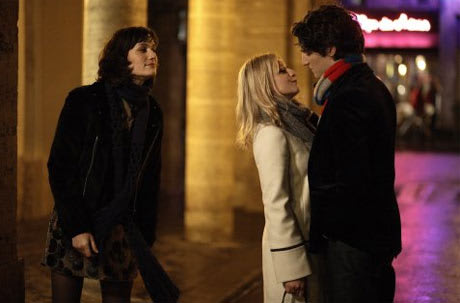Writer/director Christophe Honoré (Ma mere, Dans Paris) has built a career out of circumventing expectations. Eagerly merging genres, he bounds between moods, machinegun sprays allusions and eschews conventional plot structures. With Love Songs (Les Chansons DAmour), he has crafted a grand melange: at turns it is a classic musical, ensemble comedy, character study, romantic meditation, melodrama and homage to the French New Wave. Though omitting a number of the above strands would beneficially tighten the film, its ardent ambition, stellar performances and understated visual panache largely, although not entirely, compensate for its dalliances. At the outset, the long-term relationship between Ismaël (frequent Honoré collaborator Louis Garrell) and Julie (Ludivine Sagnier) has become stagnate despite public displays of song. To bridge the couples growing disconnection figuratively, sexually and musically they invite Alice (a magnetic Clotilde Hesme) to join them in a domestic ménage à trois. Thus, the first act plays like an atypical relationship comedy before an early volta drastically changes the course, jarringly beginning an existential meander that leads to intermittent stalking and, naturally, a lot more singing. As fancifulness subsides, the songs become suddenly incongruent, detrimentally highlighting the change in tone. Early numbers, including the mischievous waltz "Je N'Aime Que Toi and the whimsical argument "De Bonnes Raisons/Inventaire, heighten the playful air. Similarly, the foreboding "La Bastille fosters growing tension. However, as the film gains emotional weight, the musical interludes prove too slight to carry the burden. Affected lyrics replace effective dialogue and easy pop stands in for poignancy, leaving talented actors with little to do. The dramatic impetus rests largely on Garrel, who copes admirably with its fluctuating tenor, deftly meshing Ismaëls charisma, misery, self-entitlement, and confusion. While he loses two major assets when the fantastic Sagnier and Closme all but disappear early on, hes aided by the rest of the universally strong supporting cast, especially Grégoire Leprince-Ringuet as a willing surrogate for his displaced affections and Brigitte Roüan as Julies curious mother. Shot in Paris, director of photography Rémy Chevrins cityscapes shift from morose to frenetic whilst retaining a unifying grey palette. The aesthetic frames the narrative and tempers the tonal unevenness. Furthermore, Honorés often fluid, but never distracting, camerawork moves it along at a decent pace. Presumably the density of the film rendered DVD extras superfluous. Aside from English subtitles and a theatrical trailer, the package is bereft.
(Seville)Love Songs
Christophe Honore

BY Scott TavenerPublished Jun 26, 2008